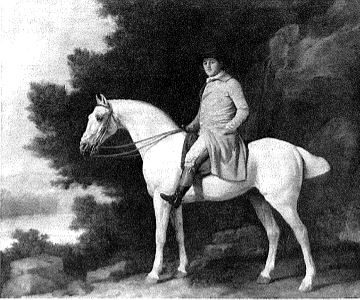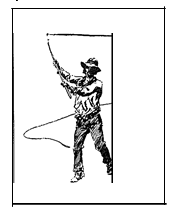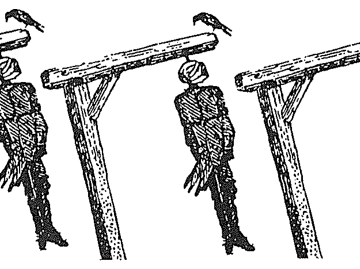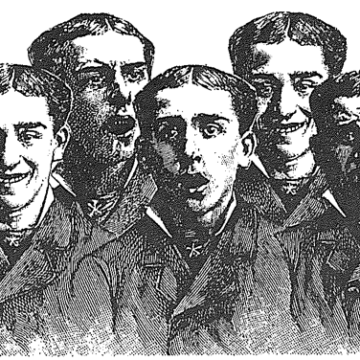Under the Cherry Moon directed by and starring Prince; Warner Bros. “Once upon a time in France,” Under the Cherry Moon begins. Indeed: Once upon a time in France, a kid from Minnesota who’d made good came out to try to do better. Nice would be nice, he decided, with all its tacky money, and...
Category: Vital Signs
Critic’s Choice
Like any civilized society, America reveres its artists. Unfortunately, in this as in most other things, we tend to go overboard. Consequently, we are all too often subjected to the spectacle of a ludicrous buffoon like Gore Vidal on national television pontificating on public policy questions, or a Norman Mailer—a man who once stabbed one...
The House That John Built
In the 1980 film Atlantic City, Burt Lancaster, portraying a has-been racketeer, turns to a young companion while they’re walking along the Board walk and exclaims, “You should have seen the Atlantic Ocean in the old days.” According to Louis Malle, the film’s director, the producers wanted to cut that line: “They said it didn’t...
The Genius of Redundance
“Simplicity,” the Russian proverb tells us, “is worse than theft.” Meaning, economy is just another name for sterility. This is an easy thing to believe as I write this in the middle of London, the Old World piling up stone all around me in a paean to the unnecessary. But what is necessary? As Tolstoy...
Ground Zero, 1950
In December 1950, at the Nellis Air Force Base outside of Las Vegas, the Atomic Energy Commission set off the first atomic bomb since Nagasaki. The year before, the Soviets had conducted their first atomic test—an unpleasant surprise to most Americans—and Mao had taken over China. Truman announced in January of ’50 that he was...
Big Brother Sits for a Portrait
“It is highly desirable that people heading the party movement, be, at last, depicted in powerful Rembrandt colors in all their robust vitality.” —K. Marx What Khrushchev in his secret speech at the Congress of the Soviet Communist Party called “Stalin’s cult of personality” is, in fact, the most common and the most stable component...
Growing Cotton and Communism on the Mexican Stage
When a killer quake ripped through Mexico City last September, it crippled the young theater season then taking shape. In the aftermath of the national tragedy, playhouses went dark for a fortnight. Actors were idled and unpaid, and playgoers turned for sustenance to motion pictures and television drama. But the theater, fabulous invalid that it...
The Virgin and the Paparazzo
The battle lines are drawn. On one side, Pope John Paul II and the French National Federation of Catholic Family Relations, along with numerous religious groups in this country. On the other, the American media, including New York magazine, the New York Times, Gannett newspapers, and many, many more. The issue: Abortion? Nuclear weapons? Return...
Without a Barrel
Thundering through the Falls of Niagara is the overflow of all the Great Lakes except Lake Ontario. The combined waterpower of Horseshoe Falls and American Falls has been estimated at some four million horsepower. Both Falls drop more than 150 feet; their combined width is nearly four-fifths of a mile. Even Oscar Wilde, like Sarah...
Selling the Farm: Country Music in the 80’s
If it ain’t broke, don’t fix it. For 30 years country music has alternately ignored and embraced that small truth, always bouncing between the apparent threat of extinction and last-minute rescue. And now, after a decade of “evolution” and “transition,” the country music industry again is surprised that the real thing was good enough all...
A (Re)Movable Feast
“A morality which has within it no room for truth is no morality at all” —Flaubert ” . . . But the thing is, you know, let’s face it, there’s a whole enormous world out there that I don’t ever think about, and I certainly don’t take responsibility for how I’ve lived in that world....
Paying and Praying on the Old Homestead
Farming “will remain the same though Dynasties pass,” thought Thomas Hardy. In our own day, the farmer is beginning to be treated like an endangered species, a poor moulting bird that tenderhearted environmentalists want the government to take under its brooding wing. Hollywood became interested in him a few years ago, and a spate of...
Triptych of a Tartar
“The terrible thing, my dear, is not that they call Schnabel the Michelangelo of our time. They call everybody the Michelangelo of our time. The terrible thing is that Michelangelo was really the Schnabel of his time, and I’m the only one who will tell you so.” The speaker, red-bearded and blue-eyed, is so slight...
Material Wealth and Spiritual Poverty
Down and Out in Beverly Hills has a lot going for it. The film was directed and co-written by Paul Mazursky (Moscow on the Hudson). It has Richard Dreyfuss, Nick Nolte, and Bette Midler in the lead roles, as well as Tracy Nelson and “Little Richard” Penniman in supporting roles. The film was photographed in...
Train of Fools
In the 30 years since it first gained broad popularity, rock ‘n’ roll has put on some show; it has been by turns entertaining, grotesque, energetic, absurd—and always “successful.” There were even times when it had a good beat and you could dance to it. But since the 60’s, the decade of pervasive Relevance, an...
Treasures From Spain
In an extraordinary gesture of international goodwill, the Spanish Ministry of Culture this past fall selected the rarest books and manuscripts from Spanish libraries for an exhibition at the New York Public Library. Items on display ranged from a 13th-century manuscript on the game of chess to exuberant prints by Joan Miro. Libraries from all...
Karl Bodmer’s America
To see America through the paintings of Karl Bodmer (1809-93) is a rare experience. Last summer and fall, thousands of Americans shared in this experience by visiting an exhibition of Bodmer’s works at the Metropolitan Museum of Art in New York City. The exhibition, commemorating the 150th anniversary of the 1832-34 North American expedition of...
Beware the Limelight
“Who can keep up with anything these days?” —Denis Donoghue, The New Republic, 3/10/86 “If a National Theater is to be in only one city, it should, of course, be in New York, the center of the country’s cultural life and the fount of its theatrical traditions. That’s where the acting and directing talent would...
Dancing a Narrow (Party) Line
The tradition of the American musical film is a grand one, reaching back as it does to the great days of Busby Berkeley, of Astaire and Rogers, of Dick Powell and ZaSu Pitts. It suffers from one defect, inherent in its genre: how to find a plausible or at least not risible plot to tie...
Old Changelings and New Mutants
To focus some thoughts on current trends in American theatrical style—as distinct from play writing—it may help to use a telescoping lens to zero in on a classic play, not itself American. The play I have in mind is one that was recently produced not in the bazaars of New York but in one of...
Jeweler to Royalty
A million dollars for an egg? But of course, not all eggs come from chickens. Malcolm Forbes recently paid $1 million for an “egg” by Faberge at a sale of Russian art at Sotheby’s in New York City. The cliche has it that diamonds are a girl’s best friend, but why then are the jewels...
What Became a Legend Most?
Poor Zoe. Poor William. Poor Lillian. As if it were a conspiracy to compensate for what they deemed a distortion of the facts, the critics seized Zoe Caldwell’s one-woman show Lillian, written by William Luce, as an occasion to say more about Lillian Hellman than to discuss the biodrama they were offered. The most prevalent...
In Search of a Playwright
“That ever recurring topic, the decline of the drama, seems to have consumed of late, more of the material in question than would have sufficed for a dozen prime ministers . . . “ —Edgar Allan Poe, 1845 “[The 1922-1923 Season is] the first season in a generation not to have been described as the...
Roundhouse Marxism
There is danger in reading too much into popular entertainment, particularly into a film that was obviously thrown together to extend Sylvester Stallone’s string of money-making movies. The Wall Street Journal may be correct in saying that this latest blockbuster is mostly a tiresome rehash of its predecessors. All of them, including this one, roll...
Sympathy for the Devil
Abbott Redux One would have thought to have heard the last of Jack Henry Abbott. Back in the early 1980’s, you’ll remember, Jack Abbott was a literary cause celèbre: here was a great, lost writer, condemned to an unending and unfair prison term, but discovered and redeemed by Norman Mailer. True, Abbott had murdered a...
Class Acts
There is a kind of unity in Sam Shepard’s career—as dramatist and actor—that seems the result more of art than of chance. A new staging of his 1977 play Curse of the Starving Class gives us a rare opportunity to look back. Bradley Whitford, who plays the son Wesley, even looks like a younger Sam...
Out of Balance
Ray Pentzell, head of the Hillsdale College theater department, attended university during the heyday of improvisational theater off-Broadway. When he could, Pentzell traveled down from Yale to New York dressed in the “straightest” outfit he could put together. His objective was to be picked by the improv players, who often selected hapless members of the...
The Grandeur of the Getty
In its setting, landscaping, architecture, and art collection, the J. Paul Getty Museum is unique in America. Outside and inside, the museum is designed to delight and stimulate visitors, especially those devoted to art, aesthetics, archaeology, and history. Nowhere at the Getty is there a trace of eccentricity. Of course, the Getty epitomizes the power...
Old Dutch Buggies & New Asian Shrimp Boats
Both Witness and Alamo Bay explore the tensions that arise when dissimilar cultures meet, when people must meet the demands of an alien land. In Witness, a streetwise Philadelphia homicide detective, hardened by a climate of violence and corruption, must hide out among the peaceful Amish of rural Pennsylvania Dutch country. In Alamo Bay, a...
Teenagers and Lower Forms of Life
While Teen Wolf was opening this past summer in 1,500 theaters. Kiss of the Spider Woman found only 15 receptive movie houses. This may seem odd, given that Teen Wolf is a formula flick, a werewolf comedy in which Lon Chancy Jr. would’ve felt at home, while Kiss of the Spider Woman is “Cinema” writ...
On the Waterfront
Singin’ in the Rain, now playing in New York, is wonderful fun and a witty commentary on the world of Hollywood musicals. Unfortunately, the main focus of the plot—Don Lockwood’s romantic interest in sweetnatured Kathy Selden—is weak. Lina Lamont, the blond bombshell who most definitely “ain’t dumb,” steals the show completely. I kept hoping for...
The Man Who Loved Birds
“I drew, I looked upon nature only; my days were happy beyond human conception.” John James Audubon, who wrote these words, was born 200 years ago in Les Cayes, Haiti. To this day, he remains unrivaled as the greatest painter of birds, with the possible exception of Edward Lear (1812-1888). Unlike Audubon, though, Lear painted...
The Sumptuous Basket
In New York City there is a room for wonder. Each year, for the past decade and more, the exhibitions held in this small room have left viewers in awe. The extraordinary quality of these shows devoted to the art of China makes a visit to China Institute worthwhile at any time of the year,...
Noble Savagery
The Emerald Forest was often discussed as the surprise film of the summer season. It is certainly that and perhaps more. Although Mr. Pallenberg’s tribute to pristine nature suggests that yet another environmental evangelist walks the corridors of a Hollywood studio, the sheer visual beauty, exacting detail, and anthropological authenticity give this film a majesty...
To Market, to Market
With the rising interest in art education in this country, these two books have appeared at an opportune time. John Hardy translates several essays by the brilliant art historian Max Dvorák that originally were published in Kunstgeschichteals Geistesgeschichte in 1924. Rémy G. Saisselin refers to Dvorák’s explorations of “Geistes geschichte,” which he defines as “the history of...
Art
ART George Stubbs: More Than Horses This spring, the Yale Center for British Art in New Haven, Connecticut, displayed the first comprehensive survey in the United States of the work of George Stubbs. A self-taught painter, Stubbs (1724-1806) devoted his life to painting animals with consummate skill and remarkable virtuosity. He suffered financial...
Fortunately, It’s 1985
Nineteen Eighty-Four; Written and Directed by Michael Radford; Virgin Films. The concept of a filmed version of 1984 wasn’t without merit. After all, the timing seemed right. And when the final credits roll, we can see how precisely writer-director Michael Rad ford timed it. That is, a title explains that the film was shot in England in April-May 1984:...
Cutting the Mustard
Some 50 years ago a decree went out from Miss Gertrude Vanderbilt Whitney that all of New York City and visitors thereunto should be taxed with the newest in American art, that unto us should be biennially given a “qualitative overview of current art activity… the cutting edge.” The bad prose gives you a good idea of what to expect...
Uncle Joe & the Space Invaders
Now Random House offers a computer program to be used in college-level introductory sociology courses. Social Indicators Game, written by Robert K. Leik, et al., is both a learning drill and a game, but not the arcade variety with joystick controller and sound effects. Insert the diskette in the Apple II disk drive, turn the power...
Screen
Yawning in the Aisles by Stephen Macaulay Stranger Than Paradise; A film by Jim Jarmusch; Samuel Goldwyn. Stop Making Sense; A film by Jonathan Demme and Talking Heads; Cinecom/Island Alive. All the praise that has been heaped on these films might lead you to suppose that Jarmusch and Demme — and the assembled...
Screen – Inventing the News
The Killing Fields; Directed by Roland Joffe; Engima Productions. Any resemblance between The Killing Fields and events in Cambodia during the 1975 holocaust is purely coincidental. What we see on the screen is more often than not a figment of Sydney Schanberg’s well-developed imagination. This film adaptation of Schanberg’s New York Times Magazine story (January20, 1980) about...
Screen – Macho Machines and Female Role Models: The Terminator
The Terminator: Directed by James Cameron; Written by James Cameron and Gale Anne Hurd; Orion. The Terminator is a machine, designed by other machines to hunt down and kill human beings. At first, one feels the same way about the movie Terminator itself: it is perfectly constructed to excite, frighten, dazzle, and arouse other appropriate emotions...
Screen – Humor and Intelligence
Comfort and Joy; Written and Directed by Bill Forsyth; a Universal Release. At one point in Comfort and Joy, Alan Bird, a Glasgow disc jockey/radio personality who immersed himself in a feud between Mr. Bunny and Mr. McCool, two mobile ice cream vending companies, makes an attempt at reconciling the warring parties (reminiscent of rival Chicago bootleggers...
Revisions – The Wild (and Tranquil) West
American intellectuals have spent much of this century blaming the frontier experience for everything from cultural poverty (John Crowe Ransom) to “our lawless heritage” (James Truslow Adams). The high rates of violent crime in modern cities, they insist, cannot be caused by anything we are doing now that is, hamstringing the law enforcement system, handingout...
Screen – A Film Vacuum
Falling in Love, Directed by Ulu Grosbard; Written by Michael Cristofer; Paramount Pictures. Anyone who believes that an actor or an actress “makes” a film should sit through Falling in Love. Twice. Once for Robert De Niro. Once for Meryl Streep. Those two, certainly, are among the finest American players in the cinema. De Niro, whose eyes...
Time Warp
In the words of a 19th-century British nursey rhyme: If wishes were Horses, Beggars would ride; If turnips were watches, I would wear one by my side. There is, it seems, a fairly influential group of rather strange persons out there who are wearing turnips and telling time; what’s unfortunate is that these persons, many...
Screen – Sharks
George Perry: The Life of Python; Little, Brown; Boston. Three-card monte is a game of chance that’s often dealt by those who leave absolutely nothing to chance. To play, the dealer takes three cards, shows their faces to the player, places them face down on the table, then shuffles their position. The player attempts to...
Screen – A Big Bonbon
Romancing the Stone; Directed by Robert Zemeckis; Written by Diane Thomas; Twentieth-Century Fox. Romancing the Stone is a cinematic Raisenette: sweet, chewy, and individually unsatisfying. It is, in design and execution, sort of a Raiders of the Lost Ark for that segment of The Big Chill generation that likes to think itself above such...
Screen – Shaking a Money-Maker
Footloose; Directed by Herbert Ross; Written by Dern Pitchford; Paramount. Break dancers–those young people who go writhing, flipping, and spinning about like modern, urban, secular dervishes–probably do not think about sex once they’ve completed their bouts. Rather, they undoubtedly wonder whether there’s a chiropractor in the house. Television’s Dance Fever structurally emphasizes sex through the...




